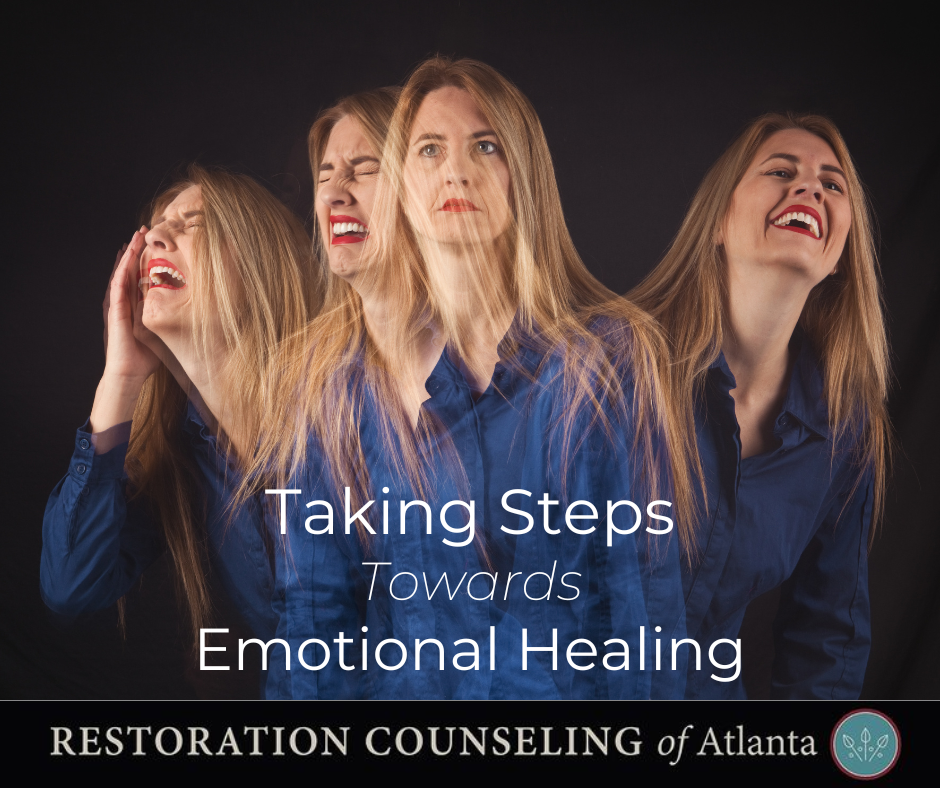Did you get a message growing up that strong emotions were bad or a sign of weakness? Or that having painful emotions meant you weren’t focusing enough on your blessings or that you were being self-indulgent? Perhaps you learned to put on a mask and deny what’s really going on inside, or you learned to cope by numbing, zoning out, or engaging in addictive behaviors. Not dealing with emotions doesn’t make them go away. It just ensures they’re going to come out sideways or get directed inwardly. Emotional healing can mean freedom.
Strong emotions can end up interfering with our ability to see ourselves and our situations clearly and can cause problems in our relationships. What happens on the inside when we don’t engage in a process of emotional healing? This can look like this:
- Feelings of helplessness or powerlessness
- Feelings of bitterness and anger
- Strong reactions to minor incidents
- Being flooded with emotions out of the blue
- Negative views of yourself
Painful emotions are universal. Everyone has them, but it’s not uncommon to go through life having never learned how to deal with them in a healthy way. Maybe it was never something that was modeled well for us growing up. Sometimes we manage to get by alright until we suddenly face a situation that overwhelms us and our usual coping mechanisms no longer work.
It’s not realistic to expect to always be ‘happy’ and free of suffering, even though we might all say we would want that. It’s more realistic to pursue ongoing healing than ongoing happiness. If healing means becoming the best version of yourself, it starts by facing painful emotions and letting that broken version of yourself be loved. What can this look like in your daily life?
Dr. Alison Cook offers some steps to take for dealing with challenging emotions in her book, Boundaries for Your Soul:
Step One
Building Awareness– this may sound simple, but just noticing what you’re feeling and naming it is a great place to start. Naming your emotions allows some distance and differentiation.
- Notice what you’re thinking
- Write down your thoughts
- Identify any emotions you’re experiencing
- Name the emotions
- Write a sentence describing this feeling
Building emotional awareness is a skill, but as you practice it daily, you’ll slowly get better at it. Merely acknowledging and naming your feelings soothes the reactive part of the brain and helps you function better. It can improve your decision-making, empathy for others, and ability to learn and grow.
Step Two
Getting Curious- Once you’ve become aware of a strong or painful feeling, start asking yourself some questions. When you focus compassionately on the troubled parts of yourself, you can find out what might bring them relief. Let curiosity take the lead instead of condemnation.
- Where do I feel this emotion in my body?
- How is this familiar, and where and when did it start?
- If this emotion were an image, what would it look like?
- Can I extend some compassion to this emotional part?
This curious posture allows you to move from judging and criticizing to acceptance and compassion. Beating yourself up only increases emotional pain and shuts down the healing process.
Step Three
Invite God to Help- The Holy Spirit is our ally, our comforter, and our counselor. When we invite God into our pain, fear, or anger, we give Him access to the deepest parts of our wounded hearts. He longs to befriend us and bind up our broken parts so we can experience wholeness. We might have mixed feelings about inviting Him in, and it’s ok to acknowledge those too.
- What’s it like to invite God into my emotional experience?
- Am I noticing any fears or reservations?
- Can I express this honestly to Him?
Noticing your feelings with honesty while suspending judgment keeps your heart open before God. These feelings may not immediately go away but inviting God into your experience through prayer can ground you in more calmness, clarity, and confidence.
When Emotions Stem from Trauma
Practicing these steps over time can help you better recognize and regulate painful or overwhelming emotions. Sometimes there is a need for deeper emotional healing, however, troubling emotions are cues to unprocessed trauma. When past experiences overwhelm our capacities to digest what has happened, unprocessed neural connections cause the body to continue to react to familiar triggers long after the original threat has passed. Our nervous system doesn’t know the difference between a real or imagined event, and trauma can cause us to experience all the feelings of a past event as though it is occurring in the here and now. Processing and diffusing these neural connections through specialized treatment can break someone out of this cycle.
Internal Family Systems (IFS) and Eye Movement Desensitization Reprocessing (EMDR), and Polyvagal exercises are some trauma-informed treatment modalities that are useful to help individuals heal from more entrenched emotional experiences. By addressing the physiological effects of trauma in the body, these modalities are often more effective for trauma than talk therapy alone. Trauma-sensitive treatments like these are collaborative and client-centered, and always take care to avoid re-traumatization while processing emotions.
 Carrie Beck is one of our graduate student interns. She takes a holistic, collaborative approach, tailoring theory to the individual. She works with individuals overcoming anxiety, depression, addiction, trauma, OCD, grief, chronic health issues, divorce, life transitions, and relational and parenting challenges. As an intern, Carrie is available at a reduced rate.
Carrie Beck is one of our graduate student interns. She takes a holistic, collaborative approach, tailoring theory to the individual. She works with individuals overcoming anxiety, depression, addiction, trauma, OCD, grief, chronic health issues, divorce, life transitions, and relational and parenting challenges. As an intern, Carrie is available at a reduced rate.
Written by: Carrie Beck, Graduate Student Intern
Roswell Location and Online
carrie@restorationcounselingatl.com x 126

